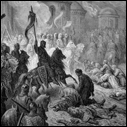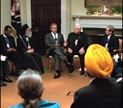Pictured: President George W. Bush meets with American faith leaders in the Roosevelt Room on September 20, 2001.
Akbar Ahmed, Professor of Islamic Studies at American University
Diana Eck, Director of the Pluralism Project at Harvard University
 Does Religion Condone or Condemn Violence?
Does Religion Condone or Condemn Violence?
Begins at 22 min 30 sec
Most religions teach compassion, kindness and peace. So why have so many acts of violence been committed in the name of faith, from the Christian crusades to the 9/11 attacks?
Pictured: The Siege of Constantinople in 1204. The Fourth Crusade is considered one of the last acts of schism between the Eastern Orthodox Church and the Roman Catholic Church.
Reza Aslan, author of “How to Win a Cosmic War: God, Globalization, and the End of the War on Terror”
Jack David Eller, author of “Cruel Creeds, Virtuous Violence: Religious Violence Across Culture and History” and professor at the Community College of Denver
 Searching For God After 9/11: Anne Mulderry
Searching For God After 9/11: Anne Mulderry
Begins at 45 min 56 sec
Stephen Mulderry worked on the 89th floor of the South Tower of the World Trade Center. His mother, Anne, says her Catholic faith helped her come to terms with Stephen’s death, and to ultimately forgive Osama bin Laden.
Pictured: Anne Mulderry with her son Stephen at his high school graduation in Albany, New York.
Anne Mulderry, member of September 11th Families for Peaceful Tomorrows



